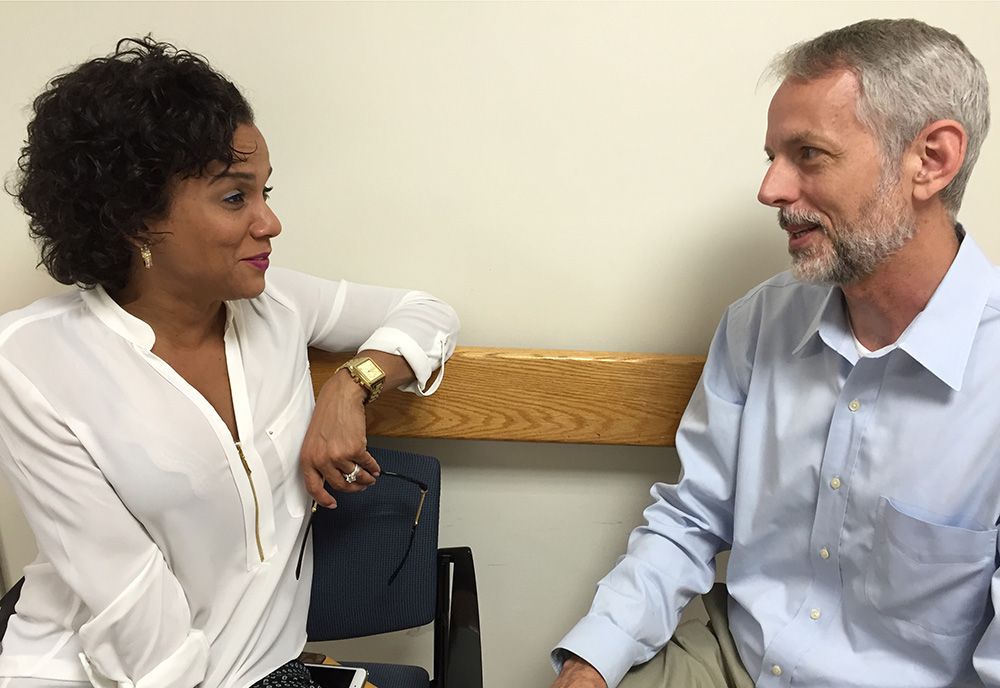Veterans Health Administration
Talking Spiritual about Moral Injury

Army Veteran Marianela Lantigua, Army Veteran, served as a Truck Driver in Iraq and Chaplain John Schultz.
“Hi. I’m Chaplain John. Would you like to talk?” Most patients say “Sure,” says Chaplain-Resident Schultz describing the practice to meet with patients shortly after they are admitted to VA’s St. Albans campus, a residential facility.
While Schultz is Catholic, Harbor’s Chaplaincy Clinical Education Program is interdenominational, including full-time, residents, mental health chaplain fellows and intern chaplains, ; chaplains meet with patients of all faiths unless a patient specifically asks to talk with someone of a specific faith. VA chaplains, he says, are part of an interdisciplinary team that may include a psychiatrist, psychologist, social workers, nurses, physicians, physical therapist, dietitian and others, who meet regularly to coordinate patients’ care. Like other clinicians on the team, chaplains co-contribute to patient outcomes.
The path from Moral Injury to moral repair is long and requires courage.
Chaplains explore a patient’s spiritual well-being and provide spiritual comfort and care in the moment and as part of a longer term care plan with other clinicians. The unique role of the chaplain is to assist patients with connecting their spiritual resources with their spiritual/religious needs. One area a Veteran may be struggling with is moral injury.
Moral injury can come about when a Veteran experiences “perpetrating, failing to prevent, bearing witness to, or learning about acts that transgress deeply held moral beliefs.” For instance, a soldier may have killed an enemy combatant in battle.
The way Chaplain Schultz describes “moral” is a matter of ought. A chaplain may be able to help a Veteran address the thoughts they may be asking themselves about what they did in combat that may conflict with what they now think they ought to have done.
These experiences, Chaplain Schultz says are often kept inside and compartmentalized. “‘I’ve never told anyone this’ are words chaplains and other clinicians may hear. Because these thoughts remain pushed away and avoided,” says Chaplain Schultz. “Veterans keep replaying past incidents and may have nightmares or sleepless nights, and can experience many other destructive symptoms including withdrawal, addiction issues, self-sabatoging, self-harming and self-condemnation. These patients can view drugs and alcohol as the only escape. Over time, though, these attempts at coping break down.”
“Memories that are discarded, shamed, somehow they may come back in different ways, disguised, perhaps seeking another outlet.,” says Chaplain Schultz, referring to a quote from Elie Weisel, Holocaust Survivor and teacher of tolerance and Nobel Laureate, who recently passed.
Chaplain John Schultz
Chaplain Schultz also talks about the need for all humans to speak about and process their feelings. He notes a comparable in the Book of Lamentations in the Bible which details individual laments of despair that often end in renewed faith and hope after expression.
Both chaplains and psychologists are convinced that bringing the issues into the open and processing and reflecting on them with guidance from supportive clinicians in a thoughtful plan of care is the best way to treat moral injury.
Chaplains first approach Veterans by engaging in conversation and at times asking them to complete a brief spiritual self-assessment that asks straightforward questions about levels of guilt, shame, anger, anxiety and general spiritual well-being. Spirituality refers to a quest for meaning and purpose and connection. While for many God is part of that context, spirituality applies to believers and atheists alike.
With moral injury where the Veteran blames himself /herself, shame and guilt can be overwhelming. “Many Veterans are seeking forgiveness. From whom? From a moral authority. For each person this moral authority can be different. For some it is God, for some it is peers and family – ultimately each can struggle with forgiving themselves.
“A chaplain can model this forgiveness for a patient, perhaps helping them experience God’s forgiveness. Most important is connection – the Veteran is not alone. I may tell a Veteran, ‘I forgive you. I am as guilty as you. I am a citizen of this nation which sent you into combat. We are all complicit.’”
The path from moral injury to moral repair is long and requires courage. For these Veterans the return home from the battlefield is only the first step. More work is needed for recovery but in that work there are others who care, there is hope and there is recovery and renewal.



















